Revolve Recycling Aims to Fill Important Gaps in the Bicycle Industry
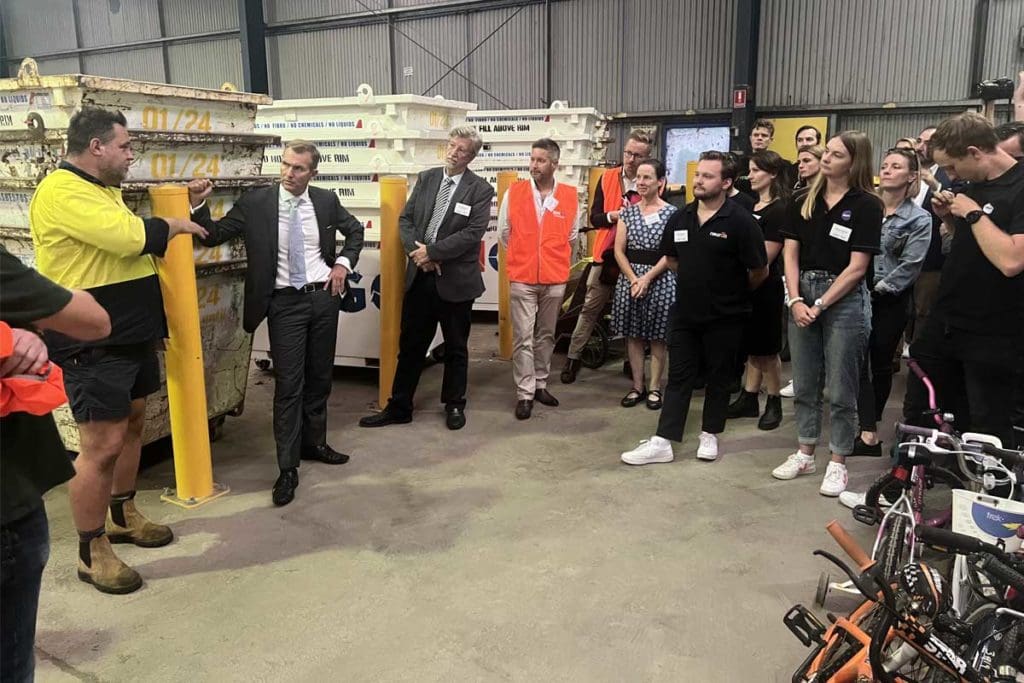
Sydney, NSW
Bicycle recycling specialist Revolve ReCYCLING officially launched its expanded facilities in Sydney last week, within the Bingo waste management depot at Alexandria in the city’s inner south.
Speaking at the launch on Tuesday 14th February, general manager Guido Verbist gave an overview of Revolve’s operations and reason for being, using 10 numbers in ascending order.
“Six is the current number of staff employed at Revolve ReCYCLING,” he began.
“Fourteen is the average weight in kilograms of the bikes Revolve collects. With over 4,000 bikes collected so far, that is a total of over 60 tonnes that would otherwise most likely have ended up in landfill.
“Every bike we collect costs us $10 to collect,” Guido explained. “If we just sell them for scrap at their commodity value, we get $7, a gap of $3. That’s the problem every recycling service faces that we need to crack.”
“Forty stands for the number of kids bikes we give away per month.”
Part of Revolve’s solution to this gap is to restore and sell bikes when it is economically viable, but an important midway point for bikes that can’t be fully restored is to strip any viable components and sell these to bike shops.
“Twenty-five is the percentage of waste that bike shops can now divert from landfill through our new zero waste service we have introduced,” Guido continued. “That stands for 125kg of waste per month. If you multiply that by 125 bike shops in Sydney, you can save 180 tonnes of waste per year.
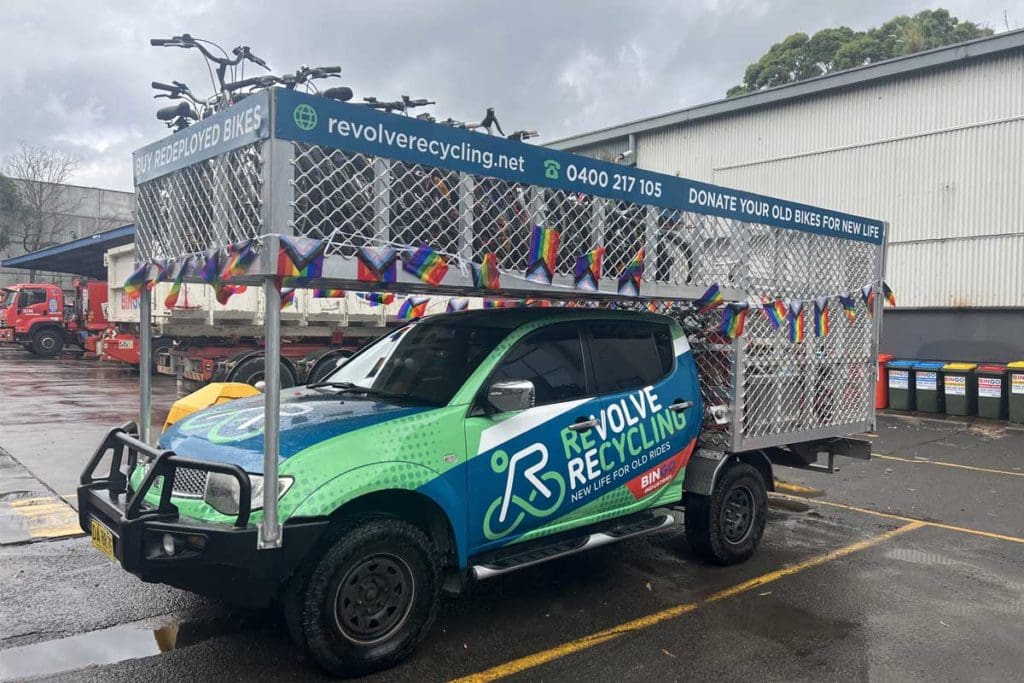
“Forty stands for the number of kids bikes we give away per month. We came to realise when we saw all these kids bikes coming here that we have to treat them differently to adult bikes.
We get a lot more of them and on average they’re in much better condition than the adult bikes.
“The reason is that they’re not used for that long. The kids grow out of them. But we realised there is also a big segment of the population that has no bikes. That’s the reason for the new foundation we’ve just set up. The purpose is to give all the children in Australia a bike. We have a group of volunteer mechanics to help us fix all those children’s bikes.
“Ninety stands for the average hours that a big box retailer bike, like those from K-Mart, lasts. They actually represent more than 50% of the market here in Australia.
“In the USA, there is a campaign launched by bike shop mechanics called ‘Built to Fail’. They realise that the average (lifetime usage) time that (mass merchant) bikes last is only 90 hours.”
Guido went on to explain why bikes should be required to meet tougher minimum standards than the quality of bikes often sold through mass merchants.
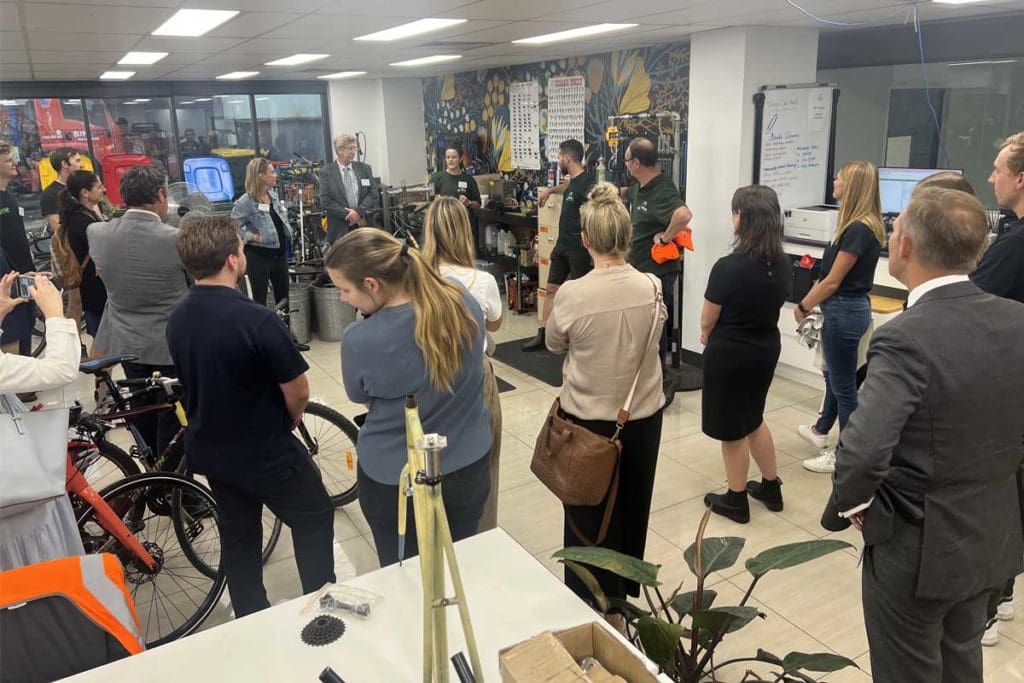
“Ninety-six stands for the CO2 (carbon dioxide, measured in kilograms) that is generated to produce a new bike,” Guido continued. “This number is from the European Cycling Federation. That is saved when you buy a second-hand bike because you don’t have to produce another new one.
“With all of the bikes we have redeployed in one year of existence, we have already saved over 70 tonnes of CO2.
“One hundred is the average time it takes (in minutes of labour) to get a bike ready for resale. That’s a number we need to keep an eye on because it makes a difference between (economically) sustainable or not sustainable.”
Guido then explained in more detail how they decide which bikes will simply be recycled at a loss, which will be restored and sold, which will be stripped for parts to sell to bike shops and then a final category of older/rarer collectible bikes that would require an uneconomic amount of labour to restore, but are too good to sell for scrap. These are set aside in a separate room and sold as restoration projects to enthusiasts.
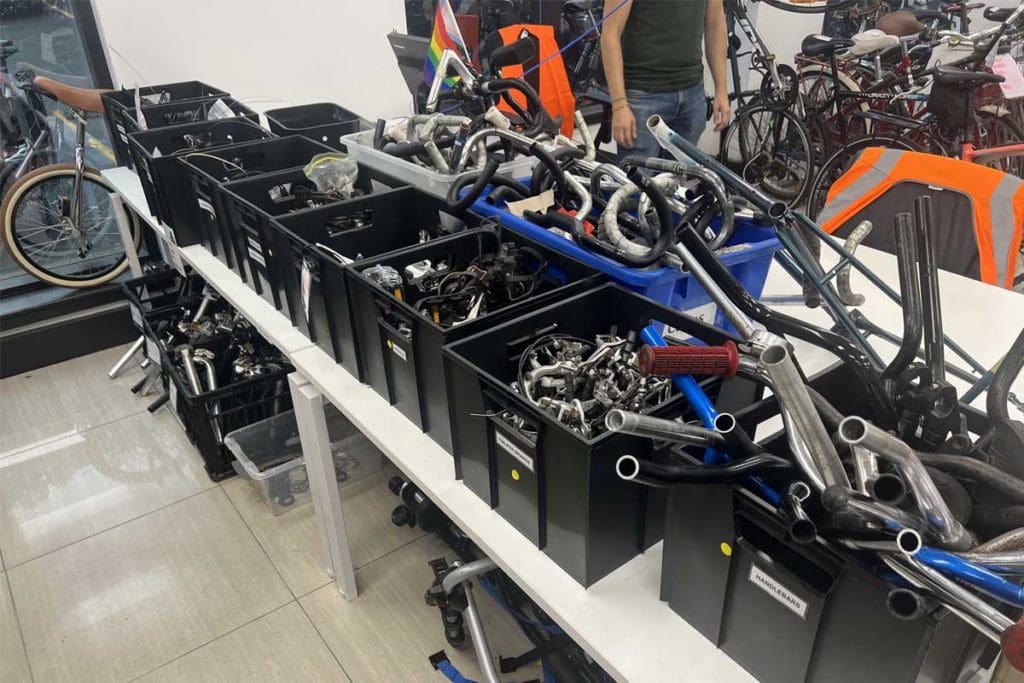
He continued with his next number: “178 is the number of OnYahBikes we currently have removed from the city. We think there were close to 300 out there when they went into administration last year and deactivated the whole system, so that it’s impossible to electronically track them.”
“My final number is 350,000. That is the number of bikes we know are not needed by Australian households every year.”
The operators of ongoing bike and scooter share fleets, including Lime and Beam – who were both present at the launch, are also proactively looking out for the disused bikes and passing them on to Revolve as they find them.
Guido continued: “250 is the average price of all the bikes we sell here. We chose a fair and affordable price rather than trying to get the maximum for them. Each bike sells for roughly one third of its original price. We want to have them moving fast and to give everyone the opportunity to get into bikes. If we keep the price low, there is an incentive for people to get a bike from, us rather than a big box retailer, and then have a more pleasant experience.
“My final number is 350,000. That is the number of bikes we know are not needed by Australian households every year. They would go to landfill if we don’t do this. That’s what we have our eye on and why we think there’s a future for us.”
Bingo Australia CEO Chris Jeffrey spoke about how his organisation envisaged its large facility in Sydney would gradually become more of a charity hub.
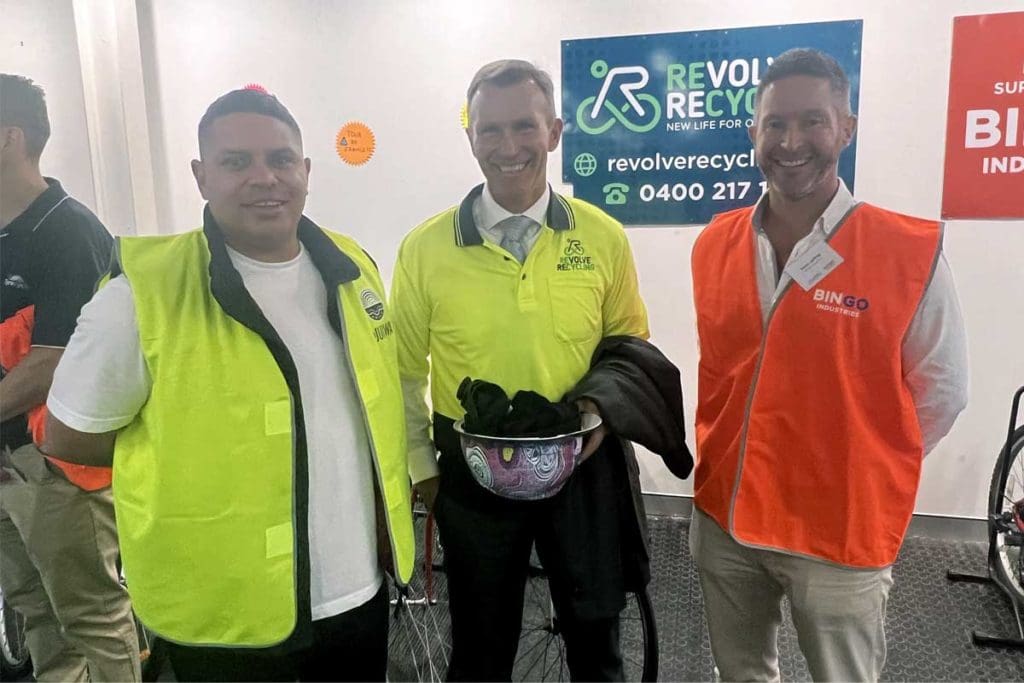
Violence on the Earth and Each Other
Then it was the turn of the soon-to-be-retiring NSW Minister for Active Transport, Minister for Cities and Minister for Infrastructure, Rob Stokes, to share his thoughts.
The following is not a full transcript of his speech, but includes some parts that would be considered quite radical for any politician from one of the major parties to be publicly expressing.
“Every day that we live our lives, we’re trapped into committing violence on the earth that sustains us – pretty dramatic words to say, but it’s true,” the Minister began.
“Every time we get in our vehicles, we are, frankly, using resources in a way that’s completely unsustainable.
“We’re actually putting other people at risk. Unless we’re glued to the road every moment of every day that we’re driving, we’re creating the opportunity for risk of violence and damage wherever we go. I know that sounds dramatic to put it that way, but we’ve trapped ourselves in patterns of growth that aren’t sustainable. We can’t keep doing what we’ve always been doing.
“It’s one thing to say “We want to be peaceful people”. That’s fine, but that by itself is not sufficient. The words are a start, sure. We hear business talk about these noble ideas of ESG – environment, social, governance. But it’s all well and good to talk about things. It’s quite another to demonstrate that we’re actually doing them.
“We can’t do everything all at once. It will take time. And we need baby steps to change the patterns of how we live every day, otherwise we’d send ourselves mad. Everything we do, every part of our day is sort of unstainable, so we can’t turn things around overnight.
“One of the important things of starting today with an acknowledgement of country is not just as a point of respect to the indigenous people here today, but to recognise that they provide a powerful example of sustainability. The way that aboriginal people have lived, from time immemorial in Australia, didn’t require motor vehicles. I don’t know, but I doubt it was something that was ever missed.
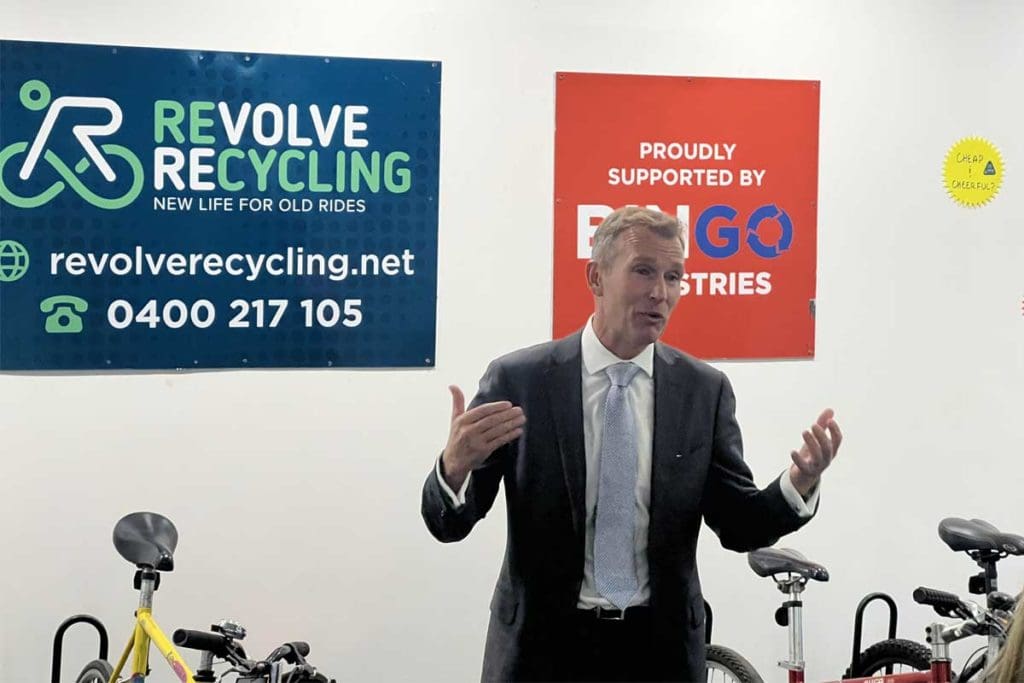
Sustainability a Hopeless Concept
“There is an ecological economist called Daniel Bromley who said, “Sustainability is at once a fine idea but a hopeless concept.”
“It’s a fine idea because it points us to the plight of future generations. But it’s a hopeless concept because it’s devoid of any operational content – we talk about it, but how do we do it?
“Well this is how we do it! This is what (the team at Revolve ReCYCLING) are doing every day.
“It’s probably a dollar a kilometre to drive a car.”
“And how wonderful that through purchasing bikes here and supporting the team, that we’re supporting jobs that are giving back, and restoring us to our environment, rather than damaging it.
“It is about us doing things right for the next generation. Recognising the pathways that we’ve gone down that are the wrong way, that trap us into unsustainable, expensive lives.
“Operating a motor vehicle, according to the tax office, I think you get 74 cents a kilometre, (The expense allowance was actually increased to 78 cents per kilometre from 1st July 2022) so that’s the tax office minimum, but it’s probably a dollar a kilometre to drive a car.
“In a time of massively increasing costs of living and at a time when, as Peter McLean from Bicycle NSW often says, two million trips by motor vehicle in Sydney every day are less than two kilometres. If you extrapolate that across a year, that’s more than a billion dollars of effectively wasted resource that comes out of family budgets.
“We’re forcing people to do that because it’s either unsafe to use a bike because the roads aren’t built that way, or because our footpaths aren’t safe enough that people feel they can walk or cycle between places. There’s so much car dependency that we’ve created, that we’ve got to reinvent. But it starts here. It starts with the great work that Pete (Shmigel) and the team (at Revolve ReCYCLING) are doing.
“It is a revolution and it’s one that’s going to make lives better. Imagine how liberated we would be if we didn’t have to use motor vehicles, ideally at all or, less ideally, as much. We’d save money. It would be better for our mental health. It would be better for our physical health.
“The NSW health budget is $32 billion per year. A bit over one quarter of your taxes are spent on health, which is great, but 88% of that is spent treating non-communicable disease. The biggest proportion of that is Type 2 diabetes. The biggest contributing factor for Type 2 diabetes is inactivity. If we could get people just cycling or walking a little bit more, we’d be healthier, wealthier, it would be better for our physical and mental health.
“It would also be better for our relationships because when you’re walking or cycling you actually have to say hello to people! Wherever you look, this is a pathway to human liberation and freedom. The stakes are actually that high.
“This is a very exciting project and I’m so humbled to be in this place. As a politician, I go to so many things that don’t matter. It’s wonderful to go to something that does matter.
“I’d like to end with one quote because it seems appropriate. There was a guy called Andy Leopold who wrote The Sand County Almanac. He was a great environmentalist 80 years ago, and he wrote something about America that I think is hauntingly relevant to Australia.
“He said, ‘We abuse land because we treat it as a commodity belonging to us. When we see land as a community to which we belong, then we’re on the path to treating it with love and respect.’ That’s what this is about and I’m so excited to be here.”
Bicycle NSW CEO Peter McLean wrapped up the launch by saying: “Transport equity is a massively growing challenge in our society today. We’re creating an environment, and it’s been coming for decades, that it is getting harder to move around.
“It’s getting more costly, prohibitive, lots of other barriers, to move around. A bicycle breaks that down very significantly. It makes it cheaper to move around. And obviously with a (refurbished second-hand) bike for $100, $200, $300, a reliable piece of transport, we can change that quite quickly.”
